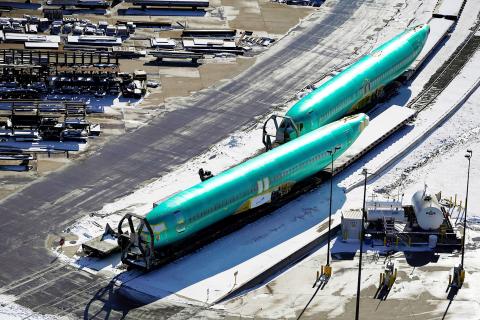As Boeing Co prepares to shutter much of a huge factory near Seattle that builds the grounded 737 MAX jet, the economic hit is reverberating across the US in places such as Wichita, Kansas; Stamford, Connecticut; and Cincinnati, Ohio.
Those cities are home to some of 900 companies worldwide that supply parts for the troubled plane, which analysts say is the largest manufactured product exported from the US.
Boeing does not plan to lay off any of the 12,000 workers at its factory in Renton, Washington.

Photo: Reuters
However, smaller parts companies, such as Wichita-based Spirit AeroSystems Holdings Inc, might not have that luxury. They could be forced to cut employees and some might even get pushed out of business.
With 13,500 workers, Spirit is the largest employer in Kansas’ biggest city. It gets half of its revenue from making fuselages for the 737.
Even though MAX production had slowed earlier in the year, Spirit and other suppliers continued to crank out parts, putting many of them in storage. As of Friday last week, Spirit had 90 fuselages on a ramp adjacent to nearby McConnell Air Force Base.
CFM International SA, a joint venture between General Electric Co and France’s Safran SA, which makes the MAX engines, also faces uncertainty.
The Cincinnati-based firm on Tuesday said that it is working with customers and other suppliers “to mitigate the impact of the temporary shutdown of the 737 MAX production.”
The company, which has more than 80 manufacturing sites worldwide with about 50,000 workers, said it can move people and manufacturing across multiple engine programs. That might hold off any layoffs.
CFM produces other engines for commercial and military aircraft.
Stamford-based Hexcel Corp, which makes composite materials used on the 737 MAX frame and engines was already reporting lower sales after Boeing slowed the rate of MAX production.
On Tuesday, the company tried to sound hopeful, saying it was confident in the airplane’s long-term success and looked forward “to its return to flight and gradual ramp-up in production during 2020.”
The 737 MAX is such a big product that by itself, the production hiatus would shrink US GDP by about 0.5 percent in the first quarter of next year, JP Morgan Chase & Co economist Michael Feroli said.
That could cut the US economy’s growth rate by about a quarter to 1.5 percent.
Joseph Brusuelas, chief economist for RSM, a tax advisory and consulting firm, predicted layoffs by suppliers and wrote in a note that some might have trouble staying in business.
“It cannot be overstated just how important the domestic and global supply chains associated with Boeing are to the small and medium-sized firms,” Brusuelas wrote.

CHIP RACE: Three years of overbroad export controls drove foreign competitors to pursue their own AI chips, and ‘cost US taxpayers billions of dollars,’ Nvidia said China has figured out the US strategy for allowing it to buy Nvidia Corp’s H200s and is rejecting the artificial intelligence (AI) chip in favor of domestically developed semiconductors, White House AI adviser David Sacks said, citing news reports. US President Donald Trump on Monday said that he would allow shipments of Nvidia’s H200 chips to China, part of an administration effort backed by Sacks to challenge Chinese tech champions such as Huawei Technologies Co (華為) by bringing US competition to their home market. On Friday, Sacks signaled that he was uncertain about whether that approach would work. “They’re rejecting our chips,” Sacks

NATIONAL SECURITY: Intel’s testing of ACM tools despite US government control ‘highlights egregious gaps in US technology protection policies,’ a former official said Chipmaker Intel Corp has tested chipmaking tools this year from a toolmaker with deep roots in China and two overseas units that were targeted by US sanctions, according to two sources with direct knowledge of the matter. Intel, which fended off calls for its CEO’s resignation from US President Donald Trump in August over his alleged ties to China, got the tools from ACM Research Inc, a Fremont, California-based producer of chipmaking equipment. Two of ACM’s units, based in Shanghai and South Korea, were among a number of firms barred last year from receiving US technology over claims they have

It is challenging to build infrastructure in much of Europe. Constrained budgets and polarized politics tend to undermine long-term projects, forcing officials to react to emergencies rather than plan for the future. Not in Austria. Today, the country is to officially open its Koralmbahn tunnel, the 5.9 billion euro (US$6.9 billion) centerpiece of a groundbreaking new railway that will eventually run from Poland’s Baltic coast to the Adriatic Sea, transforming travel within Austria and positioning the Alpine nation at the forefront of logistics in Europe. “It is Austria’s biggest socio-economic experiment in over a century,” said Eric Kirschner, an economist at Graz-based Joanneum

BUBBLE? Only a handful of companies are seeing rapid revenue growth and higher valuations, and it is not enough to call the AI trend a transformation, an analyst said Artificial intelligence (AI) is entering a more challenging phase next year as companies move beyond experimentation and begin demanding clear financial returns from a technology that has delivered big gains to only a small group of early adopters, PricewaterhouseCoopers (PwC) Taiwan said yesterday. Most organizations have been able to justify AI investments through cost recovery or modest efficiency gains, but few have achieved meaningful revenue growth or long-term competitive advantage, the consultancy said in its 2026 AI Business Predictions report. This growing performance gap is forcing executives to reconsider how AI is deployed across their organizations, it said. “Many companies